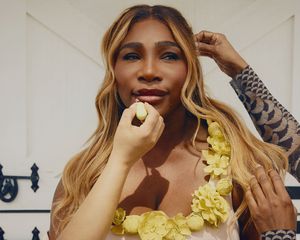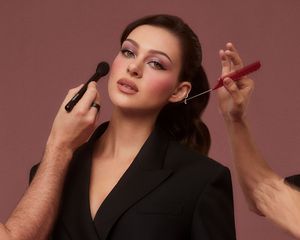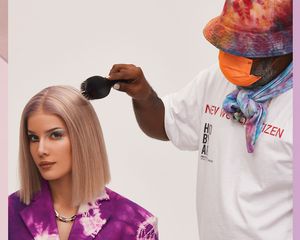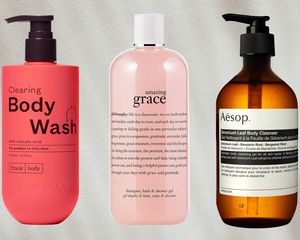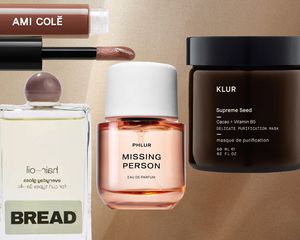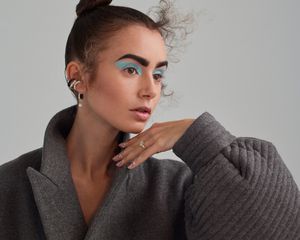Traditionally, the "B-side" refers to the flip-side of a record. The A-side contains the more front-facing hits; the singles—but on the B-side, you can get in a bit deeper with the artist. And quite honestly, there's no better metaphor I can think of for the creative team behind a beauty look. They pull the references, scour the archives, and paint the picture you see on the big screen. The celebrity, model, or actor is the single with the most air time. But the glam team? They're the producers, conductors, friends, and family. For lack of a less ubiquitous phrase, they make it work.
It has always been our mission to shine a light on the BTS of beauty, as the artistry of hair and makeup is an intricate, detailed exploration at the cross-section of aesthetics and culture. Why? Because the origin of a look is just as important as the look itself. The backstory deserves its own hard-earned glory.
This time around, we're introducing you to Fiona Stiles and Gregory Russell—the masterminds behind the hair and makeup looks for Byrdie's sophomore issue, Dualities, featuring Lily Collins. Below, join us in taking a peek behind the curtain with Stiles and Russell, as their advice and beauty musings are fantastical and humbling in equal measure.
Makeup: Fiona Stiles
"[Lily] is a dream to work with," Stiles says, "she's kind hearted, funny, and so open to collaboration." Stiles describes the trust between herself and Collins, swooning over her facial structure and ability to trust her team to run wild with a look. "Her features are so delicate and I love working with the contours of her face. But mostly, I love the connection and time we spend together, as well as working with her and Gregory as a team. The creative connection I have with those two is something I cherish," Stiles says beaming.

The shoot's first makeup look is a perfect example of Stiles' genius and Collins' remarkable ability to do both; she can look prim and doe-eyed—and then she works a look so exceptionally rad it's almost chilling. Stiles painted her face pink and secured a jeweled fishnet on top, the dichotomy of which spurred the theme for our issue, Dualities. The inspiration for Stiles, though, was a few different images, both by Annie Leibovitz. One, a photo of Meryl Steep where her face was painted white, and the other, a portrait of John Belushi and Dan Aykroyd with blue face paint as the Blues Brothers. "I love how adding color here and there changes the face entirely," Stiles says, adding, "Lily is often photographed very romantically, and I was looking to explore other ways of interpreting her features."
The second look, the powder blue shadow and black brows which ended up making the cover, was a nod to the end of the '90s. I'd be remiss not to mention Lily Collins' brows, as I'm pretty sure they have their own Twitter page. She's known for them, they're lusted after by millions, and Stiles felt this was an apt opportunity to accentuate them. "I began my career as a makeup artist in the '90s—and though many are currently referencing the sculpted nude looks of Kevyn Aucoin—for me, the '90s were about minimalist makeup with bold choices from the later part of the decade." Stiles coos over the looks from David Sims shoots and Pat McGrath for Italian Vogue or i-D. "Dick Page would take a bare face, use a slash of black eyeliner, and relish in its imperfection," Stiles says. "We are in a time of such hyper-perfection that I wanted to explore the feeling of rough hewn work, of blurry lines and swaths of color."
In that same vein, Stiles wanted the final look to feel tough and not remotely ethereal. She chose incongruent shades for the eye, excited about the color-clash. "Other color choices could have felt soft and romantic, but I wanted to keep away from overly polished," she explains.

"Beauty can be anything, which is why it's so wonderful. It can be sensual, beautiful, repulsive, and empowering," Stiles says. She was a goth as a teenager, which "served as protection for a very sensitive person navigating the world," she tells me. She characterizes her 20s and 30s as a softer, more traditionally feminine time in her makeup exploration. "It was about finding my place in the world and seeing where I fit in," she explains. As she got older, though, Stiles learned makeup, for her, was about working with her features and adapting to the many changes a face goes through as it ages. "The only time I wear makeup these days is for a Zoom meeting," she says with a laugh.
That said, Stiles is still inspired to break with convention. Her references feel punk in a world of red carpets and painstaking perfection. "I like the weirdos and misfits," she says. "The bad kids who played dress up every day like their lives depended on it." As much as she relishes glamour, Stiles is also drawn to the morning after; the deconstructed work of Isamaya Ffrench is as appealing to her as the ultra-glam makeup of Tyen and Way Bandy. She names heavy-hitters like Pat McGrath, Val Garland, Diane Kendal, Francois Nars, Peter Philips, and Lucia Pieroni as mentors. "I spent countless hours pouring over the makeup looks they created for magazines, marveling at the beauty," she says in a haze of nostalgia. "Those images are seared into my mind forever."
I like the weirdos and misfits—the bad kids who played dress up every day like their lives depended on it.
She didn't just interact with icons from afar, though. Stiles worked as David Bowie's makeup artist for years in the early aughts. "Every day with him was a gift in itself, but when he would casually sing while we were working it was electrifying. Those days were, and will always be, the highlights of my career," she says. When I ask about her favorite on-set memory, she takes me to church. "It’s not one moment, it’s the moment," Stiles answers, her eyes practically dancing. "When everything comes together and the model or actress is on set and the pose, hair, lighting, and styling is all on point—there’s a moment of real fantasy, there’s nothing like it. That feeling is so satisfying. Whenever that moment happens, my creative bucket is filled and I’m satiated."
Stiles leaves me with one last piece of wisdom, a morsel I've thought about since it came out of her mouth: "Work hard. Be on time. Be kind. Know your references. Have a point of view." So, there you go.
Hair: Gregory Russell
The first time Gregory Russell worked with Collins was for the Met Gala in 2013—the theme was Punk: Chaos to Couture. She wore Moschino and Russell pulled blue and grey streaks through her hair. According to him, it's been a dream ever since. "Lily is so open our vision and inspirations; she's so collaborative. What more can you ask for? She's stunning and she wants to push a look—she's such a muse to me. I'm so grateful to work with someone like her."

The first hair look on set was an easy one to conceptualize. "She was wearing a veil, what was I going to do?" Russell jokes. "I pulled it back," he says with a laugh. The second—soft whimsical curls around Collins' hairline—was meant to juxtapose the severity of the side-knot and high-gloss finish Russell created around the back. "I was inspired by Fiona's makeup—the strong brow—and Lily, of course," he says with a smile. "The third look was this really structured, dramatized pompadour with a sharp angle at the front—it really served the makeup."
I asked Russell to take us back to the beginning of his career when he set his sights on hair. He had decided to get into beauty early on, by way of his sister, who he calls as his first-ever muse. "[She] was really into hair, makeup, and clothes," he tells me, "and it really opened my eyes to how creative I could be with those elements." For Russell, expressing himself through all art forms—whether it be hair, clothing, music, sculpting, or painting—is therapeutic. And it's been an outlet for him all his life. "It's such a release," he says. "Beauty, to me, is expressing your creativity and individual style."

Russell's beauty icons are many and widespread. He lists Cher at the top (don't we all), continuing with Debbie Harry for her iconic "cool hair," Barbara Boucher, Sylvie Vartan, Donna Jordan, Jean Shrimpton, Françoise Hardy, Sharon Tate, Diana Ross, and The Halstonettes, just to name a few. For mentors in the business, he lists the greats: Ara Gallant, John Sahag, Vidal Sassoon, Orlando Pita, Garren, and Sam McKnight.
He tells me a story about a stand-out career highlight, one I can see still lingers inside of him each time he's on set. He idealized a certain photographer for his entire career and finally had the chance to work with them. When the photographer told Russell, "The hair is beautiful," it was monumental. "Having felt like an outsider my entire youth, validation from someone I truly respected and admired really meant the world to me," he explains.
Before the interview is over, Russell breaks to laugh and chat with Lily. Their friendship is really lovely to see. "I'm modeling," he yells to her before she leaves. She answers, "You better work, honey." And that was a wrap.
:max_bytes(150000):strip_icc()/landingpage_hero_desktop_FINAL20201116-b44f94cf2bac44b89a3f6f4176199a47.jpg)
:max_bytes(150000):strip_icc()/LandingPg-BSide-2x-8f9a096781ee457790b0c57600ba2cc0.png)
:max_bytes(150000):strip_icc()/Friendships-Falling-Apart-RECIRC-b405f95c2d734fab9188097eee4b76aa.jpg)
:max_bytes(150000):strip_icc()/RECIRC-Emotional-Makeup-1ba026986abf4548bcff55b923ccacdb.jpg)
:max_bytes(200000):strip_icc()/B-Side-SF-8dc2f6d245214463860b63e1ce5aaee0.jpg)

